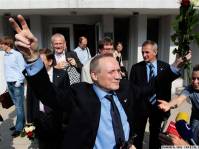More sentences passed against Belarusian opposition figures

With the EU scheduled to discuss sanctions on Monday, 23 May, two former presidential candidates – Vladimir Nyaklyaev and Vitaliy Rymashevsky – received two year suspended sentences, and activist Anastasia Polozhanko – 1 year suspended sentence.
The following discusses the sentences and likely actions from the EU. Radio Svoboda uses transliteration accepted in Belarus, while other sites use a form roughly the same as from Russian. Since many of the sentences being handed out are by no means suspended and divergent spelling is not always recognized by search machines, most material here uses the form closer to that from Russian.,
EU gears up to widen Belarus sanctions as opposition candidate sentenced
European Union foreign ministers are set on May 23 to impose travel bans and asset freezes on more people linked to the Alyaksandr Lukashenka’s regime in Belarus, but EU member states remain divided over the adoption of economic sanctions on Belarusian companies.
The extension of sanctions comes in response to the recent sentencing of opposition figures in Belarus, including former presidential candidate Andrey Sannikau, who was jailed last week for five years.
The news comes as two Belarusian opposition candidates who ran against President Alyaksandr Lukashenka in the disputed election last December have been handed two-year suspended sentences.
Uladzimer Nyaklyaeu and Vital Rymasheuski were sentenced on May 20 for their role in protests after the election, which the opposition says was rigged.
They were released from custody following the reading of the sentence.
Verdicts due on the same day in the trials of two other former candidates, Mikalay Statkevich and Dzmitry Vus, were postponed.
"The first thing we plan to do is to secure the release of our friends, " Nyaklyaeu told journalists shortly after being set free.
"Our release is the result of our general solidarity. If it hadn’t been for the support of the United States and the European Union, I wouldn’t be standing in front of you now, but I’d be sitting in an interrogation room and answering one question over and over again: ’Who am I spying for?’"
EU Blacklist
Up to 10 new names will be added to the EU’s list of close to 170 people, including Lukashenka, who are banned from traveling to the EU and have had their financial assets in EU banks and financial institutions blocked.
The list was drawn up earlier this year after Minsk’s violent crackdown on the opposition following Lukashenka’s disputed reelection in December.
New names have been added on two previous occasions in response to the regime’s unwillingness to release several opposition leaders and demonstrators.
This time the sanctions are targeted especially at individuals such as judges and prosecutors who have been instrumental in the judicial process against the opposition figures.
’Cannot Sit Still’
A council source told RFE/RL that the recent events in Belarus have made the EU "realize that it cannot sit still" and that this is an opinion all 27 member states share.
Apart from rubber-stamping the decision on adding more names, the foreign ministers will also have a general discussion about the current situation in the country.
Maja Kocijancic, the spokesperson for EU’s foreign policy chief Catherine Ashton, told RFE/RL that the discussion will touch upon the general EU approach toward Minsk.
"It is going to be a kind of a stock-taking to see where we are right now, " Kocijancic said. "We know that the situation is not good. Our concerns remain. We see that the trials and the sentencing of the opposition representatives following the elections continue. We have seen some recent convictions and we expect new ones to come, and I think that the EU is extremely concerned about these developments."
In a statement issued last week, Ashton didn’t rule out economic sanctions on Belarusian companies close to the state. Likely targets would include companies dealing with petroleum products and arms firms that have produced equipment used against protesters.
But Kocijancic said the May 23 meeting comes too early to adopt such measures.
"For the time being, the work on this is still ongoing. We are looking into this together with member states in order to put more pressure on Belarus on expansion of restrictive measures in other areas, including the area of the economy, " Kocijancic said.
All On The Table
It is believed that member states still are divided on the merits of slapping sanctions on Belarusian companies. Poland has long championed stricter measures but Italy and Latvia are unconvinced.
Rome has expressed a general dislike of targeting companies, believing that it would hurt ordinary people, whereas Latvia is thought to be wary of the knock-on effect on its own export opportunities.
According to diplomats that RFE/RL has spoken to, all sorts of other measures against the Lukashenska regime remain on the table.
EU capitals are supposed to review the entire spectrum of the relationship with Minsk, including its participation in the Eastern Partnership, which is supposed to bring several post-Soviet Union states closer to the EU.
Also under discussion is a possible boycott of the Ice Hockey World Championship that Belarus will host in 2014, a move that several prominent members of the European Parliament support.
Rikard Jozwiak
http://rferl.org/content/eu_belarus_sanctions_lukashenka_opposition_trials/24180855.html





